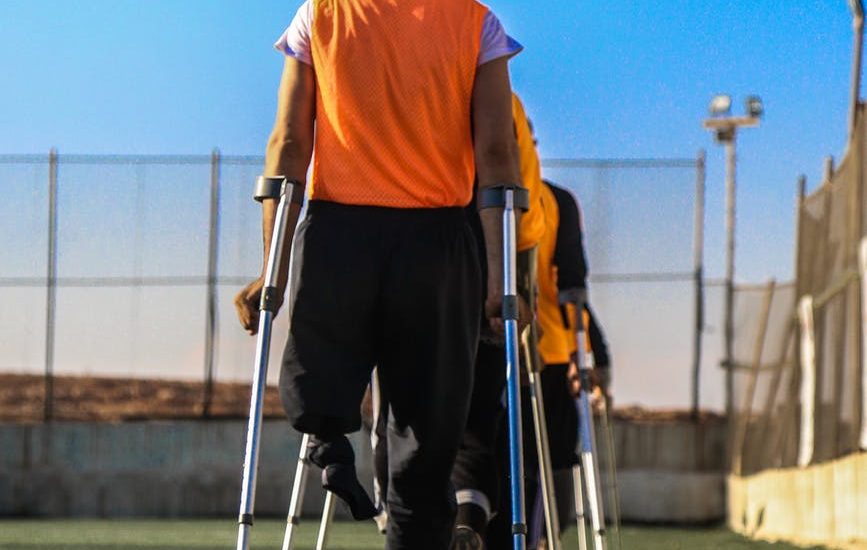The problem with Coach K’s “Next Play” philosophy
I’ve never been the type to slow down and smell the roses. But after 30+ years of triathlons, marathons, tennis, kayaking, open-water swimming and coaching baseball, the wear and tear on my body finally caught up. Step 1: Shoulder surgery to repair a torn rotator, labrum and biceps tendon.
The physical therapy is going pretty well, but wearing a bulky sling 24/7, especially while sleeping, is pretty uncomfortable. Worse, it’s a constant reminder that I’m sitting on the sidelines, not in the game. Not only is there a big hole in my calendar, but with no scheduled workouts or competitions to prep for, goal setting has to be reconfigured—big time—and I have to find a new outlet for all the extra energy.
At first it took four times as long to shower, shave, get dressed and eat, let alone type a simple email or blog post. I’ve gotten that down to 3x normal and am shooting for 2x normal within next two weeks. Range of motion and the number of reps improves with each physical therapy session, so I jot that incremental progress down in my training log. At least it fills in the blanks where workouts and race results normally go and fools my brain into thinking I’m still training.
More on fooling your brain in a minute.
My wife’s been incredibly patient during this time. She’s always better at handling adversity than I am, and she’s certainly not doting on me. Her philosophy is basically: Suck it up, take your meds, do your PT and get on with your life. “At times like these, you can’t worry about what you can’t do. Just be thankful for what you can do,” she reminds me before going out for a run or hitting the tennis court.
Most of you on this distribution list are competitive Type A achievers. When life forces you to slow down, it can be a shock to the system. It makes you realize the lengths we go to every day to try to squeeze in one more assignment, one more Zoom call, one more client meeting or one more hour of work into an already overstuffed schedule.
I can’t tell you how many of you highly compensated professionals complain to me about “time famine” more than any other work issue. Being overscheduled may make you feel productive and valuable, but does it make you happy?
The problem with Coach K’s “Next Play” philosophy|
Legendary Duke basketball coach Mike Krzyzewski, is a highly sought-after motivational speaker and business advisor. If you’ve ever watched a Duke game, you’ll hear him shouting “Next Play!” to his players throughout the game.
By that Coach K means you can’t spend your time dwelling on mistakes that you or a teammate just made. You have to shake them off and be 100% focused for the next play as your opponent brings the ball up the court.
“Next Play!” is a popular rallying cry in the business, sports and military worlds. I should know. I drank the (Gatorade-flavored) Kool-Aid for most of my adult life. But in the inevitable chase for NEXT PLAY, do we forget to celebrate our successes? Worse, do we forget to notice how much we’ve improved from earlier in the season? It’s hard to measure progress when you’re constantly obsessed about looking ahead.
Next time you read an obituary or visit a cemetery, tell me how many times you see the dearly departed eulogized as follows: “A wonderful and caring husband and father, who was always in the top 2% for billable hours”? Or “A generous and caring soul who always checked every item off his to-do list” or “A loving wife and grandmother who always answered every email in her inbox”? That’s right, never!
I don’t think I’ll ever adapt to a sedentary lifestyle, but I notice my concentration’s been a little sharper since the surgery since I’m no longer shoehorning workouts, meetings and competitions into an already packed work and family schedule.
In many ways the surgery has forced me to forget about multitasking since it’s so much more challenging to complete even the simplest tasks of daily life. And for those of you still slaves to the billable hour business model I encourage you to read our client Kyle Walters’ recent columns in Accounting Today: The 64/4 Rule and Can You Earn $10K Per Hour? I also recommend Robb Zbierski’s book: Master Your Mind, which will teach you how to slow down your runaway brain, so you can accomplish a lot more in less time.
Conclusion
The big takeaway from Walters and Zbierski: It’s not about how many hours you put in; it’s about what you put into those hours.
What’s your take? I’d like to hear from you.
#productivity, #resilience, #CoachK, #timefamine










